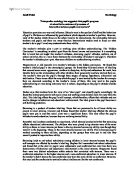Becker says that teachers have the view of an ‘ideal pupil’ and classify pupils accordingly. He found this related particularly with social class and working-class children were far away from the ideal. This labelling affects the pupil’s self-concept, which therefore, affects their attitudes and can lead to changes in behaviour and educational achievement. The label given to the pupil becomes a self-fulfilling prediction.
Streaming is a product of teacher labelling. Those that are perceived to be of lower ability are placed in lower streams. Cicourel and Kitsuse found that teacher labelling affected the streams pupils were put in and that social class was a significant factor. This may affect the pupil’s attitudes towards education, because they are not being treated fairly.
Rosenthal and Jacobson conducted an experiment, which showed conclusively that that streaming effects educational achievement. The children who were placed in top streams were of the same ability as those in lower streams yet those in the top streams became top ability even though they weren’t in the beginning. Those in the lower streams became low ability. This is because pupil’s worked according to there abilities, depending on the groups they were put in and also they weren’t pushed to improve there ability
Streaming leads to anti-school subcultures among children in lower streams because the pupil’s self-concepts are affected by teacher’s labelling. Stephen Ball researched anti-school subcultures and found that at the start all pupils were enthusiastic and conformist but over time there was deterioration of behaviour and educational achievement in the lower streams. Hargreaves found there were two distinct subcultures within schools that correlated with streams. There was a conformist subculture in the higher streams and a non-conformist subculture in lower streams. If the teacher’s didn’t stream the non-conformist may have the same ability as conformist. However, this may lead the conformist to unwind in school and become like the non-conformist.
It is shown that social class correlates with teacher’s labels, streaming and anti-school subcultures. Therefore the ‘Hidden Curriculum’ must play a part in disadvantaging children who have a poor relationship with their teacher’s.
There are examples in the education system that could disprove the ‘Hidden Curriculum’ theory. The current education system could be seen as an advantage to the teacher’s.
If the teacher prefers one child over the over, because of their class culture, this means that child is more likely to fail in educational achievement, again this is not fair because some pupil’s have an advantage, because the teacher’s are fond of them. Another example of this is the language used. Working-class children use restricted code. This doesn’t fit into the educational system because middle-class culture uses elaborated code, which gives them the ability to explain and justify to the teacher’s. This allows middle-class people the ability to succeed in the education system, because they can communicate more frequently to the teacher’s.
The home could also be seen to be to blame for the failure of working-class children in the education system. There are structural and cultural reasons. Bernstein looked in to the home as a reason for educational failure. He found that cultural deprivation was to blame. This is lacking the appropriate skills, attitudes and values. An example of a cultural reason could be that the values of the parents are placed on going out to work to achieve the material possessions that this society places emphasis on such as a foreign holiday. This would discourage higher education. A structural reason could be there is no quiet, clean, warm room to study because the parents could not afford one. This will affect the pupil’s attitudes toward school, and therefore the relationship between the teacher and pupil.
Mitsos and Brown noted that the Hidden Curriculum could be seen to blame. There is some evidence to note that teacher’s aren’t as strict with boys as they are with girls. They are more likely to extend deadlines for work, be tolerant of disruptive behaviour and accept poorly presented work. This could result in negative teacher labelling so they would be streamed into lower sets where they are restricted information and are more likely to form anti-school subcultures. Streaming usually results in lower educational achievement.
Boys are more likely to become anti-education because school promotes girls culture but discourage boys. In school you are expected to be quiet, follow authority and follow rules and boundaries. Girls have this culture imposed on them when they are young. Boys on the other hand are encouraged to play football, be loud and are expected to break the rules when young. This culture in schools is quite restrictive so they rebel. The two genders extra curricular activities also show the recognition school’s give to girl’s culture. Boys are expected to ‘do’ (e.g. play football) and girls are expected to talk. Talking and communication is a key skill needed at school. Peter Douglas argues this: “School is essentially a linguistic experience and most subjects require good levels of comprehension and writing skills”. Therefore teachers may communicate with girls better then boys, and this could affect the boy’s education.
All these theories show that pupil’s who have poor relationship with teachers are destined to fail in the education system, no matter how intelligent they are. Further research still needs to be done to fully explore the reasons why pupils underachieve at school. Some people believe that allowances should be made in the system, so that the pupil’s are treated fairly by the teacher’s. The Variety of evidence suggests that pupil’s social background has an effect on the way pupil’s experience school, including how they are treated in school by the teacher’s.



